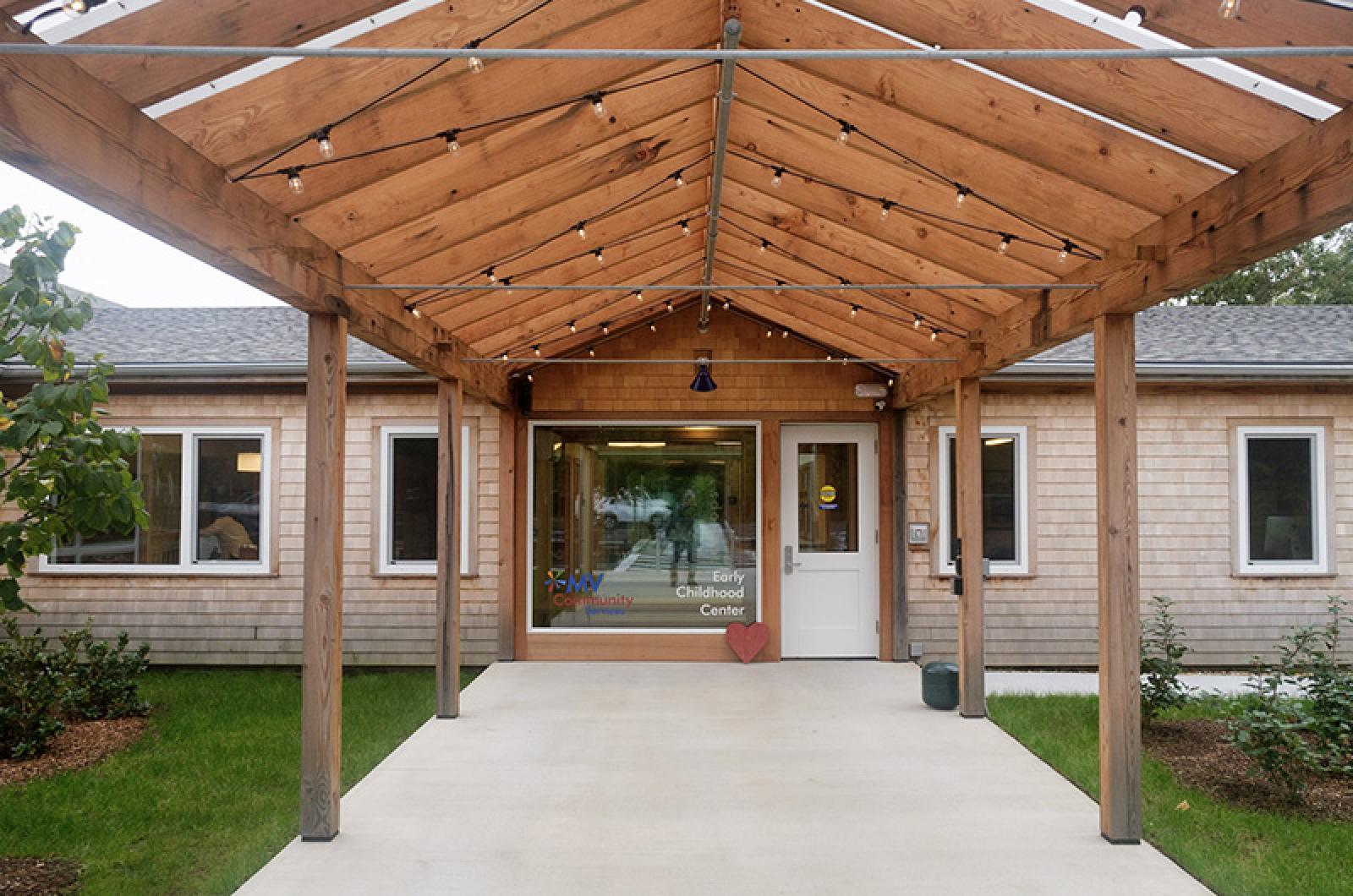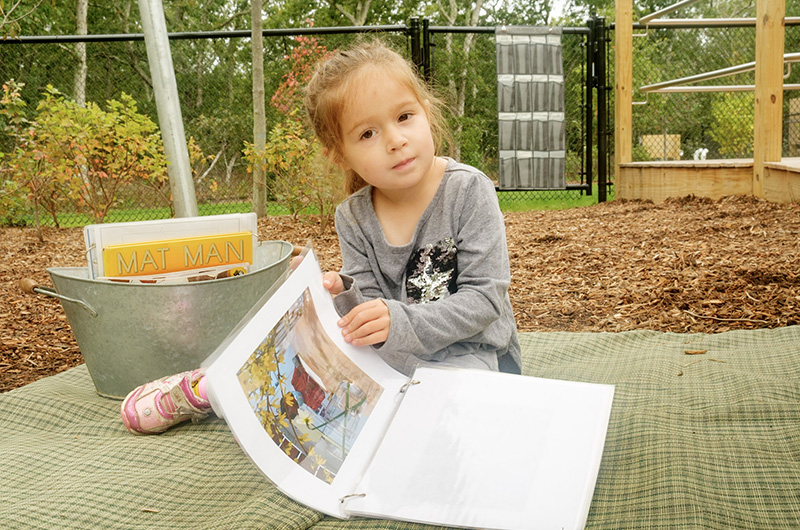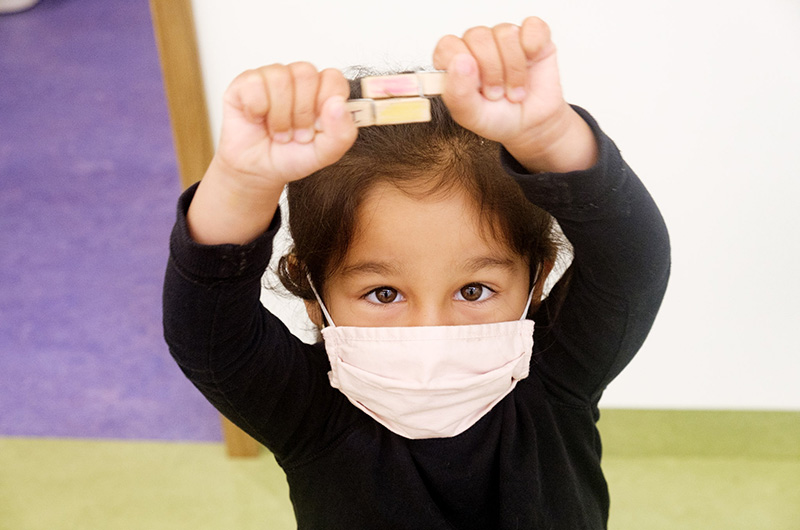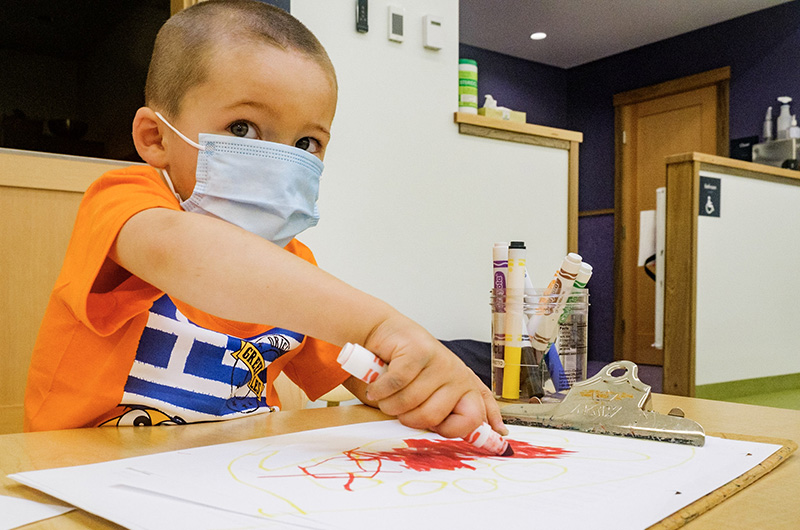Nearly half of the Island’s children aged five and younger have no place to go for care and education while their parents are working, according to statistics from the nonprofit MV Youth.
Early childhood programs on Martha’s Vineyard were already struggling to meet the demand when Covid-19 hit the Island last year. Now, even as some centers have expanded, they’re facing an acute shortage of staff.
“Overall, the picture has gotten worse,” said MV Youth executive director Lindsey Scott, who has been tracking infant, toddler and preschool programs both before and after the pandemic.
At Martha’s Vineyard Community Services, where a brand-new $8.1 million early education and care building opened last week, the infant care room’s seven cribs are empty. In order to open, the room needs three teachers.
“We have zero,” said Heather Quinn, the early childhood program director for Community Services, who has been doubling as a preschool and toddler teacher since the pandemic took hold.
Nationwide staffing shortages, worsened by the pandemic, are cutting particularly deep for care centers and preschools on the Island, where a higher cost of living collides with the traditionally low compensation for those who care for and teach the youngest children.
“With a career that is historically undervalued and underpaid . . . it’s been a tough one to attract new people to,” said Ms. Scott.
There’s also competition from public school systems, where teachers earn more to instruct children in kindergarten and up, she said.
“Early childhood education is not integrated into the public school system yet, and that’s been this great divide,” Ms. Scott said, adding: “Anyone with a degree in education can get paid more handsomely . . . in the public school system than they can in early childhood education.”
To help bridge the income gap, Community Services executive director Beth Folcarelli has launched a set of incentives for teachers at the new center, including enhanced salaries at all levels, from entry level to experienced teachers.
“It really clears a pathway for up and coming teachers to . . . develop a career in early childhood education,” Ms. Folcarelli said.
Dubbed the Pathway Program and funded by philanthropic grants, the initiative offers salary enhancements starting at $2,000 a year and increasing to $5,000. Community Services also offers signing bonuses and subsidizes professional development courses needed to advance in the field, Ms. Folcarelli said.
“It’s been very well received,” she said.
Built by South Mountain Co. from a design by company architect Ryan Bushey, the new early education and care center reflects a deep understanding of what infants, small children and their teachers need, said Ms. Quinn, who worked closely with Mr. Bushey as he developed the design.
“This will be an incredible place for any early childhood education teacher to work,” Ms. Quinn said as she stood in the center’s roomy main hall, where large windows looked into classrooms alive with small children playing and learning.
Made with non-toxic materials, such as natural linoleum and paints that don’t emit unhealthful compounds, the building has roofed porches for outdoor activities on rainy days, an all-ages playground, lines of sight throughout the building and wide windows for natural light.
For teachers on break, there’s a lounge with a “quiet room” for phone calls and privacy, a kitchenette and couch, and an Allen Whiting landscape on the wall — one of dozens of works, donated by Island artists, that hang throughout the center.
When the infant room is staffed, its seven spaces will increase by more than half the capacity of the Vineyard’s care centers to accommodate babies — but the number will still be tiny compared to the need.
This fall, the Island’s 10 home-based care centers had room for only 13 of an estimated 162 Island infants up to 15 months old, according to Ms. Scott.
Fewer than a third of the Island’s toddlers had spaces in programs, while about 84 per cent of preschoolers were enrolled.
“The problem is not specific to Martha’s Vineyard,” Ms. Quinn said. “There are child care deserts all over the country.”
Built with expansion grant funding from MV Youth and also private donations, the Community Services center is the Island’s largest early childhood care provider, with 65 spaces and a home-based Head Start program with more than 40 children.
Smaller programs are also growing with philanthropic help. Felix Neck Wildlife Center in Edgartown has developed a nature-based preschool serving 20 children. Plum Hill School in West Tisbury and the Vineyard Montessori School in Vineyard Haven have expanded, and Plum Hill added a toddler class this fall, Ms. Scott said.
Chilmark Preschool is seeing so much demand that director Anja May asked town selectmen last month if more space could be found on town property, although she subsequently withdrew the request, saying she believed current facilities would probably be sufficient.
But without more staff, Ms. Scott said, expansions like the one at Community Services will not ease the Island’s child care crunch.
“If it was just about helping those programs expand physically . . . it would be an expensive problem that can be addressed,” she said.
No amount of philanthropy can fill in for missing staff, but a Vineyard Vision Fellowship aims to help improve the picture for the Island’s youngest children by funding a network coordinator, Joanne Lambert, to work with the 10 home-based licensed care centers here, including two run in Brazilian Portuguese and one that is bilingual.
A former home care provider who closed her service after Covid hit, Ms. Lambert is charged with connecting existing providers, recruiting new ones and encouraging under-the-table programs to become licensed, Ms. Scott said.
“As soon as you have more than two kids that aren’t yours, you’re operating a program,” she said. “Joanne is making a huge effort to try to engage [unlicensed providers] so they can be counted here.” Quality early childhood education is important not only for children and parents but the economy, Ms. Scott said. “We know from . . . all sorts of data that early childhood is a critical time for brain development and personality development,” she said. “Kids need this for their own emotional and intellectual development. Parents need this to have the opportunity to be reliable employees. Employers need this . . . in order to operate businesses with regular, dependable hours,” Ms. Scott said. “This isn’t one family’s problem. It’s the community’s.”











Comments (11)
Comments
Comment policy »